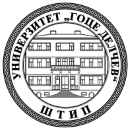CHALLENGES OF MIGRANT FAMILIES FROM EASTERN MACEDONIA

Abstract
Since its independence in 1991, the Republic of North Macedonia has faced a difficult process of transition, economic and political changes, continuous high unemployment rates and an armed conflict. In addition, the processes of globalization, industrialization and urbanization, as well as the rapid advancement of digital technology and increased mobility of the population, have contributed to numerous social changes that inevitably reflected on family structures and functions.
Today, the modern Macedonian family is very dynamic and it is adapting to internal and external changes and challenges, whilst family members strive for better life quality and conditions. In addition to internal migration from rural to urban areas in the country, in the past decades there is an increased emigration from North Macedonia towards European Union member states, as well as overseas countries. The region of Eastern Macedonia was particularly affected by the emigration of entire families, due for several reasons, the most common of which are: high unemployment rates, poor economic conditions and political instability in the country.
In this paper we will present an analysis of the current situation in Eastern Macedonia, as well a research on the challenges faced by migrant families from the municipality of Vinica.
Keywords: migration, emigration, family, Eastern Macedonia, Vinica.

